Contents
Hair loss can be a worrying issue. You might ask – does your diet cause hair loss? The answer is yes, what you eat can affect your hair health. Not getting enough nutrients can slow down hair growth and cause thinning or shedding. In fact, about 80 million Americans deal with hair loss and balding.
Your hair grows about 0.35 mm every day, and you lose around 100 hairs daily. This process needs a balance of nutrients. If you’re missing out on important vitamins and minerals, it can mess with your hair growth cycle. For example, not having enough iron can lead to anemia, which stops your hair follicles from getting the nutrients they need.
It’s not just about what you’re not eating. Eating too much of some vitamins, like vitamin A, can also cause hair loss. But, eating a diet full of plants, like the Mediterranean diet, might help your hair grow better and reduce loss.
Knowing how your diet affects your hair is important. It’s not just about eating enough protein or taking a multivitamin. Nutrients like zinc, selenium, and biotin are key for healthy hair. Not having enough of these can cause different types of hair loss.
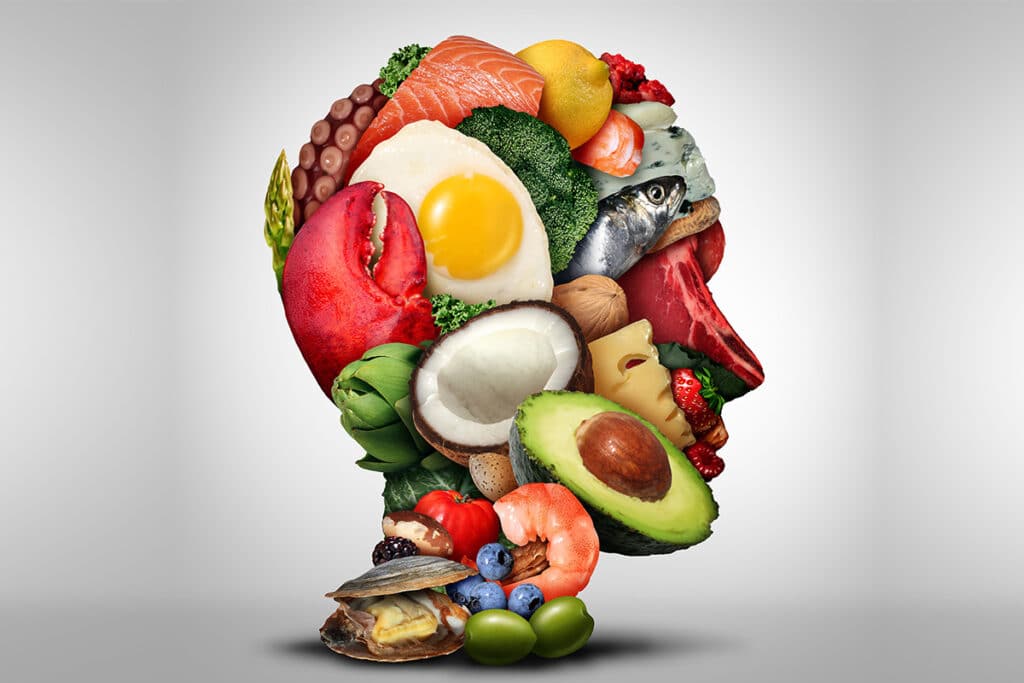
Key Points Discussed
- Diet plays a big part in hair health and loss
- Not getting enough nutrients can mess with the hair growth cycle
- Having too much of certain nutrients can also cause hair loss
- Eating more plants may help your hair grow
- Important nutrients like iron, zinc, and biotin are vital for hair health
Understanding Hair Loss and Its Causes
Hair loss is a common issue for many Americans. It can be caused by different factors. Your scalp has 100,000 to 150,000 hairs, losing up to 100 strands daily. This is normal and part of the hair growth cycle. Knowing the types of hair loss and what causes it can help you take better care of your hair.
Common Types of Hair Loss
There are various types of hair loss that can happen at different times in life:
- Androgenetic alopecia: This is a genetic condition that can start in men as early as their teens and women in their 40s.
- Telogen effluvium: This is a temporary thinning caused by changes in the hair growth cycle.
- Alopecia areata: This is an autoimmune condition that causes patchy hair loss, often in children and young adults.
Factors Contributing to Hair Loss
Hair loss can come from many things, including:
| Factor | Impact on Hair |
|---|---|
| Genetics | Most common cause of baldness |
| Hormonal Changes | Can cause permanent or temporary hair loss |
| Stress | May lead to temporary hair shedding |
| Medical Conditions | Thyroid issues, lupus, diabetes can trigger hair loss |
Does Your Diet Cause Hair Loss?
Your diet is key to keeping your hair healthy. Not getting enough nutrients can lead to hair loss:
- Not having enough iron can affect how well hair follicles get nutrients
- Not enough zinc can cause hair loss
- Not getting enough vitamin C can make it hard for your body to absorb iron
Eating a balanced diet full of proteins, vitamins, and minerals helps your hair grow strong. While some hair loss can be prevented with good nutrition and care, genetics often plays a big part.
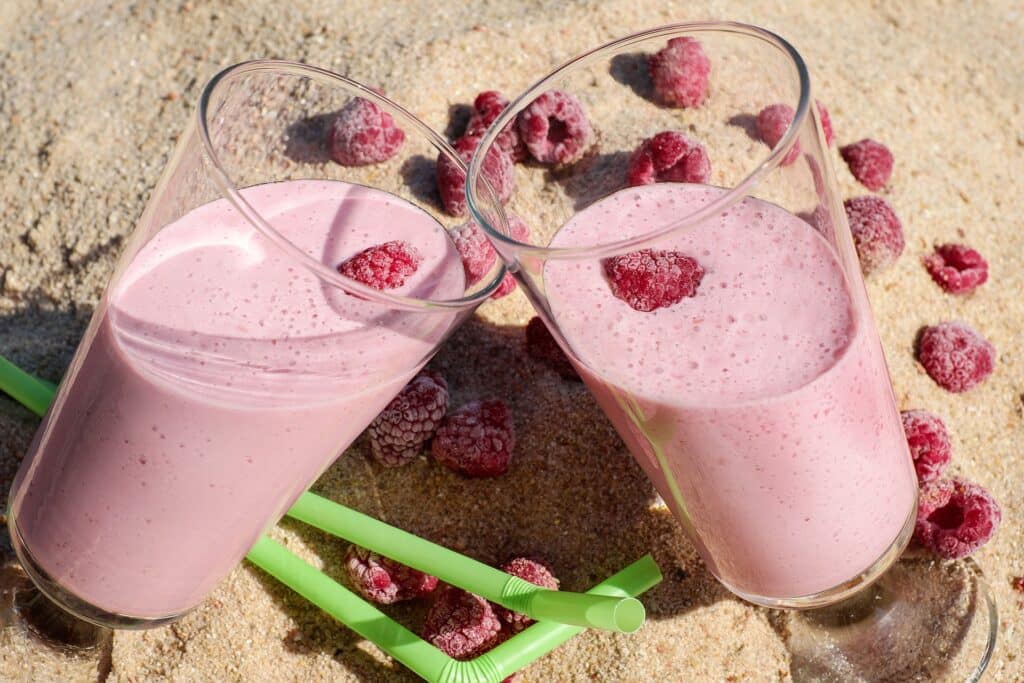
The Impact of Micronutrient Deficiencies on Hair Loss
Micronutrients are key for keeping hair follicles healthy. Your body needs vitamins and minerals for hair to grow well. There are 13 essential vitamins, 9 water-soluble and 4 fat-soluble, plus 6 minerals and 8 trace elements that help keep you healthy.
Vitamin shortages can hurt your hair’s health. For example, not having enough biotin, folate, or vitamin D can lead to hair loss. Also, not having enough iron, zinc, and selenium can mess up how hair grows.
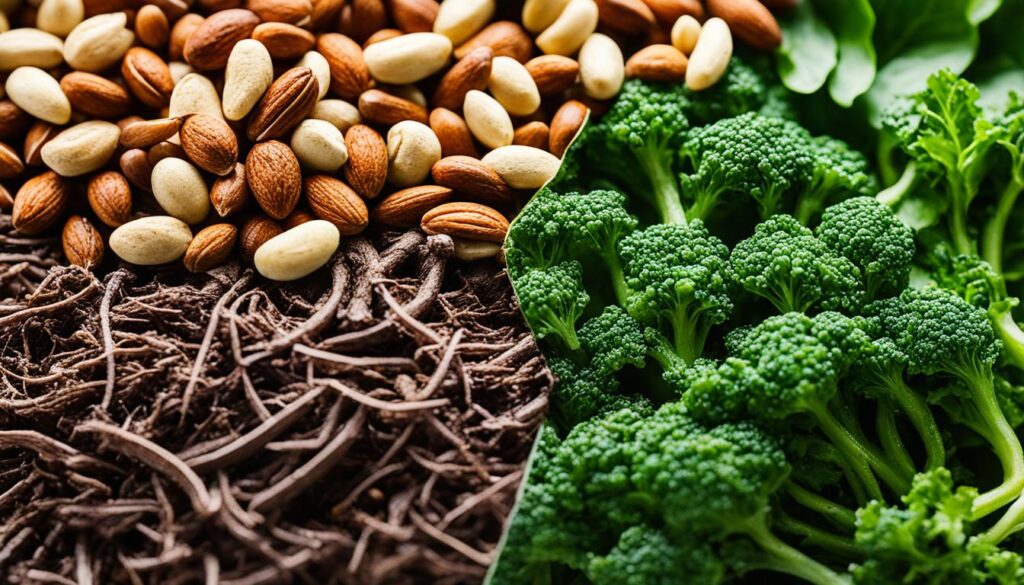
Studies show that 42% of people with early hair graying had low biotin levels. Research also found that women with certain hair loss conditions had lower vitamin B12 levels.
It’s key to know that 19 micronutrients are linked to hair loss if you don’t get enough of them. These include vitamins, minerals, fatty acids, and amino acids. Antioxidants like vitamin C, E, and A are also crucial for hair health.
To get the right micronutrients, follow the Recommended Dietary Allowance (RDA) or Adequate Intake (AI) guidelines. Remember, water-soluble vitamins are safe but fat-soluble vitamins can build up in your body. If you’re worried about vitamin shortages affecting your hair, talk to a healthcare expert for help.
Iron Deficiency and Hair Loss
Iron deficiency is common, especially among women. It can cause hair loss and the need for iron tests. This lack of iron might make hair fall out like it does in genetic baldness.
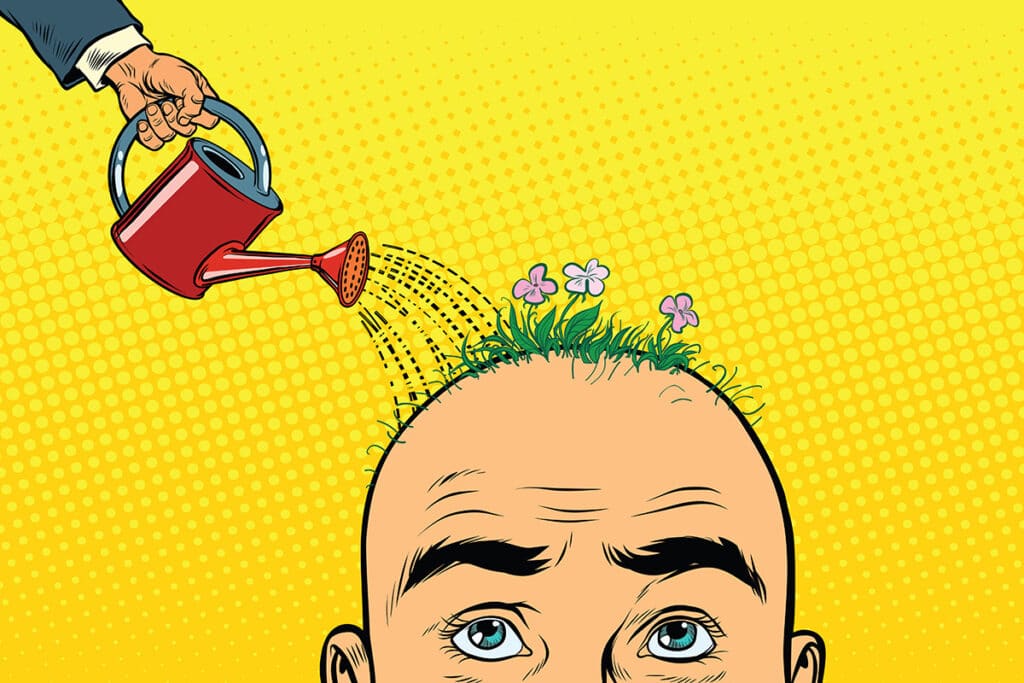
How Iron Affects Hair Growth
Iron is key for hair growth. Without enough iron, your body takes it from hair follicles for other needs. This can lead to more hair falling out and slower growth. Women of childbearing age are at higher risk due to menstruation and diet.
Signs of Iron Deficiency
Iron deficiency anemia shows through symptoms like fatigue, pale skin, and brittle nails. Hair loss from iron deficiency doesn’t scar the follicles, so hair may grow back. If you see more hair falling out with these signs, check your ferritin levels.
Iron-Rich Foods for Hair Health
Eating iron-rich foods can fight iron deficiency anemia and support hair health. Here are some foods high in iron:
| Food Type | Iron-Rich Options | Additional Benefits |
|---|---|---|
| Meat | Red meat (2 4-oz portions/week) | Highly absorbable iron |
| Vegetables | Spinach, broccoli, dark leafy greens | Also rich in other nutrients |
| Legumes | Beans, lentils | Good for vegetarians/vegans |
| Fruits | Strawberries, oranges | Enhance iron absorption with vitamin C |
Pair plant-based iron sources with foods high in vitamin C for better absorption. If diet changes aren’t enough, iron supplements may help. It can take 3 to 6 months to fix iron levels in your body.
Vitamin D Deficiency and Its Effect on Hair
Your vitamin D levels are key to keeping your hair follicles healthy. Studies show that people with hair loss often have lower vitamin D levels. A 2021 review found that low vitamin D can cause hair loss, and a 2017 study showed that those with alopecia had lower vitamin D levels.
Not getting enough vitamin D can happen if you don’t get enough sunlight or have certain health issues like Crohn’s disease or celiac disease. To keep your hair healthy, make sure you get enough vitamin D from the sun and your diet.

Fatty fish, fish liver oils, egg yolks, and fortified foods are great for getting vitamin D. Adults 19 to 55 years old need 600 IU or 15 mcg of vitamin D daily. If you’re worried about your vitamin D levels, talk to a doctor before taking supplements.
Doctors might suggest vitamin D supplements to help with hair loss12. Topical vitamin D treatments can also help, especially for androgenetic alopecia. Vitamin D is crucial for hair growth and creating new hair follicles, so it’s key for healthy hair.
Zinc Deficiency and Hair Loss
Zinc is key for healthy hair. It helps with over 300 body functions. Knowing how zinc affects hair can help prevent hair loss and aid in hair follicle recovery.
The Role of Zinc in Hair Follicle Function
Zinc is crucial for the immune system, healing wounds, and taste and smell. For hair, it protects follicles and helps them recover. People with hair loss often have lower zinc levels.
Symptoms of Zinc Deficiency
Zinc deficiency shows in many ways. Symptoms include:
- Hair loss
- Slow wound healing
- More frequent infections
- Diarrhea
- Delayed growth in children
- Delayed sexual maturity
These signs can happen if you don’t absorb zinc well or eat enough zinc-rich foods.
Dietary Sources of Zinc
To keep zinc levels right, eat zinc-rich foods. Adults need 8 to 11 milligrams a day. Great sources of zinc are:
| Food | Zinc Content (mg per serving) |
|---|---|
| Oysters (3 oz) | 74 |
| Beef (3 oz) | 5.3 |
| Pumpkin seeds (1 oz) | 2.2 |
| Yogurt (8 oz) | 1.7 |
| Cashews (1 oz) | 1.6 |
Animal foods give more zinc that your body can use than plant foods. Vegetarians or vegans might need zinc supplements.
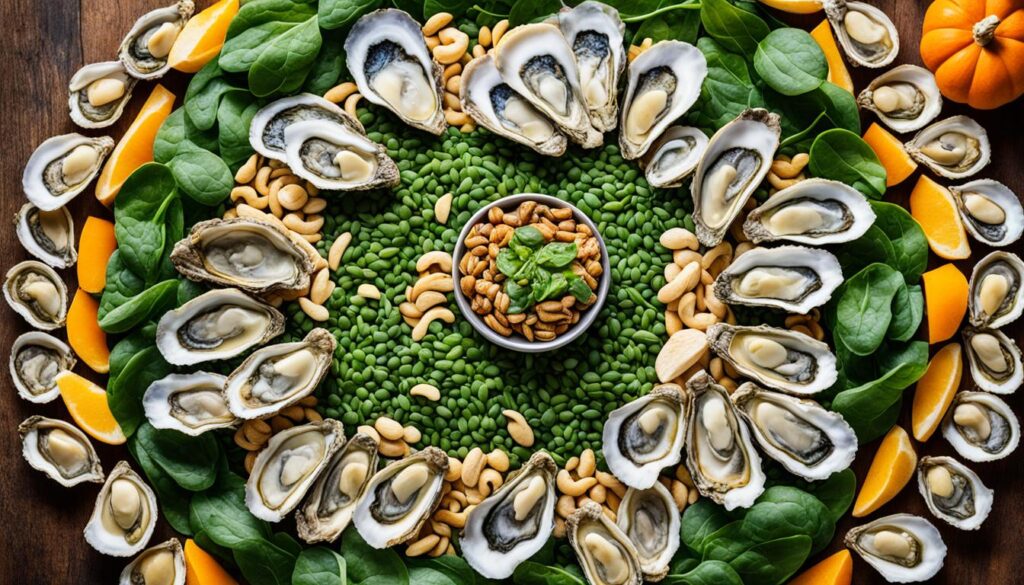
Zinc supplements can help hair health, but talk to a doctor first if you have health issues or are pregnant or breastfeeding. Keeping zinc levels up can help with healthy hair growth and prevent hair loss.
Hair Loss Dietary Causes: Calorie and Protein Restriction
Your diet is key to keeping your hair healthy. Eating too few calories and not enough protein can hurt your hair growth. Very low calorie diets can cause hair loss in some people.
Hair follicles need a lot of energy and protein to stay healthy. If you eat too few calories, your body might not focus on hair growth. This can make your hair thinner and fall out more.
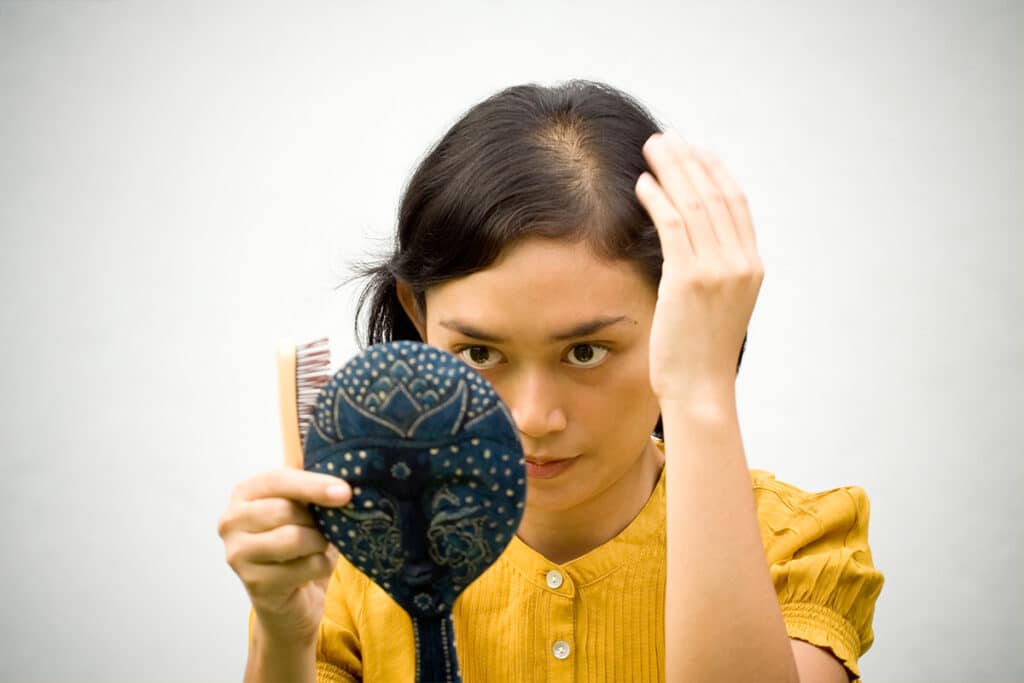
Protein is vital for hair growth. It gives your hair the amino acids it needs to be strong and healthy. Not getting enough protein can make your hair thin and break easily.
“Your hair is made of protein, so ensuring you get enough of it is crucial for maintaining luscious locks.”
To keep your hair growing well, eat a balanced diet with enough calories and protein. Include lean meats, fish, eggs, and plant-based proteins like beans and lentils in your meals. If you’re on a diet, talk to a healthcare professional to make sure you’re getting what you need without harming your hair.
Remember, losing weight too fast can lead to hair loss. Losing weight slowly and safely is usually better for your health, including your hair.
The Connection Between Weight Loss and Hair Loss
Rapid weight loss can cause unexpected hair thinning. This happens with crash diets or after bariatric surgery. Your body sees sudden weight changes as stress, leading to hair loss. This condition, called telogen effluvium, starts 3-4 months after losing weight and can last up to 6 months.

Research shows a strong link between weight loss and hair loss. More than 50% of people who had sleeve gastrectomy lost hair. In another study, 75% of women who had this surgery saw hair thinning, with 80% noticing it 3-4 months after.
Nutrient malabsorption is a big factor in hair loss after weight loss. Very low-calorie diets or limiting certain foods can lead to not getting enough biotin, iron, vitamin C, zinc, selenium, and protein. These nutrients are key for healthy hair.
| Nutrient | Role in Hair Health | Food Sources |
|---|---|---|
| Iron | Prevents anemia-related hair loss | Shellfish, spinach, legumes |
| Zinc | Supports hair follicle function | Nuts, seeds, dairy |
| Protein | Builds hair structure | Eggs, fish, chicken |
The good news is that hair loss from weight loss is usually temporary. Your body will adjust in a few months, and hair growth will return. To reduce hair loss, aim for slow weight loss and talk to a nutritionist for a diet full of important nutrients.
Supplement Use and Hair Loss: Finding the Right Balance
Supplements can be both good and bad for hair health. Some help with growth, but too much can cause hair loss. Let’s look at hair growth supplements and their effects on your hair.
Beneficial Supplements for Hair Health
Some supplements can make hair healthier, especially if you lack certain nutrients. Iron, vitamin D, and zinc are often suggested for hair loss due to nutrient gaps. Biotin supplements are popular for hair growth, but results differ for everyone.
Supplements That May Contribute to Hair Loss
Not all supplements are good for your hair. Taking too much of some can actually hurt your hair. For example, too much selenium can cause hair loss. Too many vitamins A and E can also make your hair thinner.
Consulting a Healthcare Professional
Before starting supplements for hair health, talk to a healthcare professional. They can find out if you lack certain nutrients and suggest the right supplements. This way, you address hair loss without risking too much of any vitamin or other problems.
| Supplement | Potential Benefit | Risk if Overused |
|---|---|---|
| Iron | Supports hair growth in deficiency | Iron overload |
| Biotin | May improve hair strength | Skin breakouts |
| Selenium | Antioxidant properties | Hair loss (toxicity) |
| Vitamin D | Promotes follicle cycling | Hypercalcemia |
A balanced diet is usually the best way to keep your hair healthy. If you’re losing hair, figuring out why is key. Quick weight loss and strict diets can lead to hair falling out due to a condition called acute telogen effluvium. In some cases, fixing nutrient gaps or stopping these diets can help your hair grow back.
Video Guide On Foods For Hair Loss
Watch this related video below on Various Foods for Alopecia:
Conclusion
Your diet is key to preventing hair loss and keeping your hair healthy. Eating foods full of nutrients can make your hair stronger and help it grow. Research shows that eating like the Mediterranean diet can help keep your hair healthy and stop hair loss. But, eating too many simple carbs can lead to hair loss by making too much sebum and causing inflammation.
Some vitamins and minerals are crucial for your hair. Not having enough iron can cause hair to thin and lead to bald spots. Zinc and selenium also play a big part in keeping your hair healthy21. Eating the right amounts of vitamins C, folate, biotin, niacin, and iron can stop hair loss. But, eating too much fat, acid, and sugar can stop these nutrients from getting to your hair follicles, leading to hair loss.
What you do outside of eating also affects your hair. Smoking can make hair loss worse, and tight hairstyles can cause permanent hair loss. Even though genetics and environmental factors can affect hair loss, eating well can improve your life quality and lower the risk of losing hair.
Fixing nutrient gaps with a balanced diet and supplements can help stop hair loss. If you keep losing hair, seeing a healthcare professional for advice is a good idea. They can give you advice that fits your needs.
FAQs
Q: Can a poor diet cause hair loss?
A: Yes, a poor diet can cause hair loss. Nutrient deficiencies such as lack of vitamins and minerals can lead to thinning hair and may affect hair loss.
Q: What specific nutrient deficiencies are associated with hair loss?
A: Deficiencies in iron, zinc, vitamin D, and protein are commonly associated with hair loss. A deficiency can cause brittle hair and may lead to hair loss.
Q: How does a balanced diet promote hair growth?
A: A balanced diet provides essential nutrients that promote hair growth and supply to your hair follicles, ensuring normal hair growth and reducing the risk of hair loss.
Q: Are there any specific foods that may cause hair loss?
A: Highly processed foods and those high in sugar and unhealthy fats may cause hair loss by causing inflammation and reducing nutrient supply to your hair.
Q: Can overconsumption of certain foods result in hair loss?
A: Yes, overconsumption of foods high in vitamin A, for example, can result in hair loss. Balance is key in diet and hair loss management.
A: While female pattern hair loss is often genetic, a poor diet can exacerbate the condition. Ensuring you have a diet rich in essential nutrients can help manage this type of hair loss.
Q: What are the causes of hair loss other than diet?
A: Other causes of hair loss include genetics (such as male pattern hair loss), hormonal imbalances, stress, and medical conditions like thyroid disorders.
Q: Can improving your diet lead to hair regrowth?
A: Improving your diet to include nutrient-rich foods can support hair regrowth by enhancing the nutrient supply to your hair follicles and promoting hair health.
A: The best treatment for hair loss related to diet is to address any nutrient deficiencies. This may involve incorporating a variety of vitamins and minerals into your diet, such as iron, zinc, and vitamin D, and possibly taking supplements if recommended by a healthcare provider.
Q: How quickly can dietary changes impact hair loss?
A: Dietary changes can take several months to show results in hair growth. Hair grows slowly, so patience is key when addressing diet and hair loss issues.
Source Links
- The Basics of Hair Loss – https://www.webmd.com/skin-problems-and-treatments/hair-loss/understanding-hair-loss-basics
- Hair loss – Symptoms and causes – https://www.mayoclinic.org/diseases-conditions/hair-loss/symptoms-causes/syc-20372926
- The Role of Vitamins and Minerals in Hair Loss: A Review – https://www.ncbi.nlm.nih.gov/pmc/articles/PMC6380979/
- Zinc deficiency – https://www.healthdirect.gov.au/zinc-deficiency
- An overview of the genetic aspects of hair loss and its connection with nutrition – https://www.ncbi.nlm.nih.gov/pmc/articles/PMC9710406/
- Foods That Can Cause Hair Loss: What to Avoid for Healthy Hair – Utah Hair Restoration – https://utahhairmd.com/2023/03/02/foods-that-can-cause-hair-loss-what-to-avoid-for-healthy-hair/
